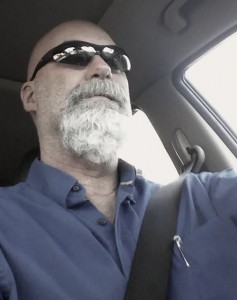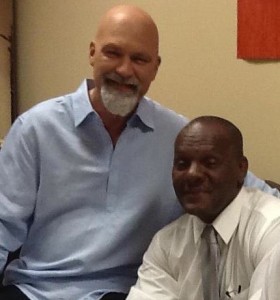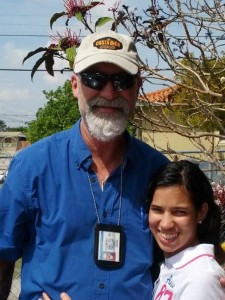The Inquisitor
A onetime orphan’s early personal losses inspire a rewarding career in reuniting families with lost kids.
Veteran private investigator Joe Carrillo believes in second chances. He’s had a few of his own: from orphanage to loving adoptive parents, from addiction to a fulfilling life’s work…and finally, from auto repo man to finder of runaways, often on a pro-bono basis.
Executive editor Hal Humphreys asked Carrillo some candid questions about how to find lost people, why he’s not afraid to push back against authority figures, and how his own life story drives him to help parents find missing kids, even if the families can’t afford to pay him for it.
HAL: Tell me about your background and how you became an investigator.
JOE: I was born in Québec, Canada, and was immediately given up to an orphanage because my parents were very poor. When I was four months old, I was adopted by a couple from Havana, Cuba.
So I went to Cuba, and then came here to the States five days before my fifth birthday. I had wonderful adoptive parents. They were always “Mom” and “Dad.” Both of them passed back in 1983, within a year of each other. At the time, I had a very bad substance abuse problem. After six overdoses, I got clean in 1983. I went into the repo business and got really good at finding people. I sold the repo end of the deal back in the year 2000, and I set out on investigations.
HAL: That’s a fantastic story. You’ve come a long way.
JOE: Yeah. I’ve had second chances in life several times. First, when I was given up to a wonderful family  because my parents couldn’t afford me. Then when I got clean, I got another second chance at life. I’ve kind of gravitated toward providing that for other people. It’s a very rewarding thing.
because my parents couldn’t afford me. Then when I got clean, I got another second chance at life. I’ve kind of gravitated toward providing that for other people. It’s a very rewarding thing.
I was born to poor parents; I have that in my blood. That’s why (business & investigative partner) Ana (Carolina Lanuza) and I do a lot of pro bono work for poor people. I don’t want them to lose their kids.
I actually looked for my mother back in 1994 through a system they have in Canada. They found her after about 4 1/2 years, but she chose not to meet me for her own reasons. And that’s OK. I didn’t do it for me; I did it for her, so she would know that I was OK. She knows my entire life story, everything about me, my kids. Basically, I sent a message to thank her for giving me the life that I have. That was very rewarding.
HAL: We in the business hear this question at least once a week: What’s the craziest story you’ve got about the PI business?
JOE: I’ve had a couple of very unusual cases. I wouldn’t classify them as crazy, because we all live in crazy every day doing what we do.

I think one of the most rewarding cases that I’ve ever had was when I was part of an exoneration case. We exonerated a man named Barney Brown whose only sin was being a black man in Miami in 1970. The Miami-Dade Police Department arrested him for a rape and robbery that he had nothing to do with; the case was thrown out in the juvenile system, and he was immediately tried and convicted and sentenced to life in prison by the adult system. He served 38 years.
In 2006, I was called in to be the investigative end of the effort to free him. When I met him in the jail, he said he was very bitter at me…because I was white. My answer, as I recall, was “Well, your lawyer is black, and I’m here to help you. If you don’t want my help, I’ll leave.” Instantly, we connected.
We fought very hard. It took three years, but now he’s free — he’s counseling young people and sharing his story with students. To receive a call one day that said “Barney is a free man,” it was just amazing.
I’ve got more stories like that, that are not crazy, but are just as amazing. These stories have not only marked me, but have marked other investigators that work with me, and have pushed us to help people that are forgotten, to help people that are thrown away, that the system steps on to make themselves look better.
[quote align=”center” color=”#999999″]We don’t solicit this work of finding kids, but when we’re called, we never say no.[/quote]
Anytime you can help people who can’t afford you, it’s an amazing thing. When we look for children, I always hear, “Hey, we called a PI, and he wanted 20 grand,” and we don’t understand that. And we never ever charge to locate a runaway who is a minor.
We don’t solicit this work of finding kids, but when we’re called, we never say no. We do our work very quietly. This year alone, we’ve already found five kids. I can’t give details yet, but we are building a project to nationally expose a problem of runaways that the police don’t look for. We feel that by this time next year, we’ll be funded enough to hire PIs nationwide, to pay them to look for kids.
HAL: Please let us know if there’s anything Pursuit Magazine can do to help out in that effort.
JOE: What we’d like to do is, through associations like FALI and FAPI, have PIs on retainer in various cities. We’ll do this (hopefully) using private donations through a foundation that has been in force for 20 years that has received recognition from the White House, from UNICEF and from the United Nations. These are people that I know, that believe in what I do and have come forward to fund this effort.
We hope that by next year, instead of 30 kids, we can find 300 kids, and then the following year, 3000 kids. That’s what we’re working for every day.

HAL: I noticed that you don’t hesitate to call someone out — like, say, the Miami-Dade police — if you think they are doing something silly or stupid.

JOE: I have a very bad character defect, which is that I’m not afraid of sh*t. I’ve been arrested before. I’ve been threatened before. It doesn’t matter to me.
I don’t take cases simply to get paid; I take cases that I believe in. If I believe in something, the power of being correct is a great power. If you are correct, I have found that you can push anybody back, whether it’s a police department, whether it’s a state attorney, whether it’s a US attorney — and the license I’ve carried in my pocket since 1986 affords me a lot of protection. Although I am at many times at odds with police departments, we have great respect for each other, and they know that.
I’ve been able to help many people like that, to my detriment. I mean, they have come after me, they have placed surveillance teams on me. They have gone out on TV and called me an informant. I was nominated Citizen of the Year for the work I do with children. The Miami-Dade Police Department said I was an unsavory character with an unscrupulous past, and they withdrew my nomination. I filed a complaint. You cannot allow yourself to be defamed or stepped on.
HAL: Talk to me about what it means to you to be a professional in this business, because there are a lot of people that just don’t seem to get the idea.
JOE: Most people think we just follow people who are cheating on their wives. But we have to be very ethical. In a divorce case or custody battle, we’re privy to the most intimate details of people’s private lives, and our work can really make a difference.
[quote align=”center” color=”#999999″]We have to be very ethical…we’re privy to the most intimate details of people’s private lives.[/quote]
If we take on a case, we need to stand by the client no matter what. I try to gain their trust; I keep their secrets, no matter if I’m subpoenaed, no matter if I’m put in front of a judge. Where I live, there are a lot of PIs who don’t do that. They play both sides, and I have a really big problem with that. We are called into situations that other people can’t solve. Our one goal is to try to help them, not to bill hourly, not to stretch the fees.
There are a lot of different ways to be a professional. I know, I’m the worst dresser in the world. I’ve got tattoos all over the place, and I only shave when I have to. But if a client trusts me with their situation, I will be 100% dedicated to that client, no matter what. I think most of us out of there are…but there are exceptions.
HAL: Talk to me about the state of the industry right now. Why should someone join state associations like FAPI?
JOE: Number one, because of the network. Number two, if you look at the membership, look where most of these people come from: law enforcement. They have been around for awhile. I find that members of associations are the true professionals.
That’s not to say you can’t be a professional if you’re not a member of an association. But one PI in the street only has so much power. When we all bond together… I’ll give you an example. These three kids were kidnapped, and through the Association, Ana sent out an email, and instantly several hundred people were looking for these kids.
We couldn’t do that if we weren’t a member of a professional association — basically, a professional network that assists law enforcement.
HAL: Talk to me about the importance of education for private investigators.
JOE: We learn every day. I’ve been doing this for almost 30 years. There’s not a day that I don’t learn a technique in the street or read a technique in one of the publications. The world is evolving daily.
When I started doing investigations, nobody used computers. There was no Internet. How did you run a tag? You took a picture and developed it and sent it. Nowadays, we’re doing it right away on the cell phone.We need to keep up-to-date on the tools that make our job faster and more accurate, especially in my line of work: looking for people.
[quote align=”center” color=”#999999″]Education is key. Nobody knows everything. Nobody is the best at everything. If you think you are the best, you’re never going to move forward.[/quote]
I think it’s very important for all the investigators to always know the best databases, the best techniques, the best resources. Education is key. Nobody knows everything. Nobody is the best at everything. If you think you are the best, you’re never going to move forward.
I’m guilty of not really looking up stuff and taking courses because I’ve molded myself to the streets, but education is key. We need to learn everything. Even old folks like me that have been doing it for a long time — we need to learn every day, or the new breed coming along will be far ahead of us. I mean, Ana has three degrees, and when we met, she had nothing. Look where her education has taken her today. She’s president of FAPI. She is an impressive young lady.
HAL: What have you learned over the years about how to locate people?
JOE: You have to go back to the beginning. When your clients tell you their problem, you’re not ready to hit the street. You need to spend hours picking their brain and pulling answers out that they don’t think they have.
That has been my key to solving every missing person investigation: You have to hit the street with direction. Take the time to interview your client.
When I was in the repo business, all the answers were in the notes of the collectors, not in the street. I remember when I got Ford Motor credit, the first car, 315 days past due. I picked it up in one day because I took the time to tell the collector, “Send me all of your notes,” because I wanted to see what the debtor was telling me in the notes. That way, I know what’s in his mind. A lot of investigators don’t do that. I found that the key is always where you start, not where you finish.
About:
Joe Carrillo works with investigative partner Ana Carolina Lanuza at Leverage Investigations, a Miami private investigations agency. He and Lanuza devote about 40% of their time to locating missing children.

